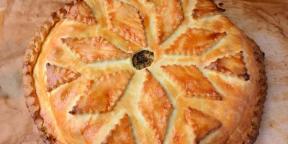The authoritative scientific journal Nature wrote about the safety and effectiveness of "Sputnik V"
Miscellaneous / / July 31, 2021
On testing, side effects and challenges to WHO approval.
The British scientific journal Nature has published article, which says that the Russian vaccine "Sputnik V" has confirmed its safety and effectiveness. We chose the main thing from this publication.
The author of the article is based on data from Russia and many other countries where residents are vaccinated with this vaccine, also known as "Gam-COVID-Vac". Even though there is no approval from the European Medicines Agency (EMA) or WHO, South Korea, Argentina and India is already setting up production of Sputnik V itself, and many other countries, including Hungary, the United Arab Emirates and Iran, import Russian vaccine.
How the vaccine works
Nature recalls that Sputnik V is an adenovirus vaccine, which means that it uses an engineered adenovirus as a mechanism delivery the genetic code of the SARS-CoV-2 spike protein into human cells. It is similar to the AstraZeneca and Johnson & Johnson vaccines, but instead of using a single engineered adenovirus, as in the two vaccines, Sputnik V uses different adenoviruses for the first and second doses respectively.
Dmitry Kulish, a biotechnology researcher at Skolkovo, noted that the reason for the use of the two adenoviruses was to increase the effectiveness of the vaccine. These adenoviruses have different methods of introducing their genetic material into the cell, which theoretically increases the likelihood of successfully delivering viral material to where it needs to be.
Vaccine registration
A vaccine developed by scientists from the N.N. N. F. Gamalea in Moscow, was approved for use by the Ministry of Health of Russia on August 11, 2020, more than a month before the publication of the results of tests of stages I and II. The scientific community was outraged by the announcement of the vaccine registration. Epidemiologist Michael Toole of the Burnet Institute in Melbourne noted at the time that such a hasty approval of the vaccine would clearly not build credibility.
Some of these concerns were allayed when Phase III test results released in February showed a 91.6% increase effective in preventing symptomatic COVID-19 infection and 100% effective in preventing severe disease disease. However, some scientists criticized the developers for not providing access to full raw data from early trials, and also raised concerns about the inconsistency of some information.
Vaccine testing
Two preliminary vaccine studies published in September 2020 involved 76 healthy adults who received two doses of different viral vectors three times apart weeks. All participants developed antibodies to the SARS-CoV-2 spike protein. Side effects mainly included mild pain at the injection site, fever, headache, fatigue, and muscle aches - all of which are common with other SARS-CoV-2 vaccines.
In a phase III study published in February, 14,964 adults were randomized to receive a two-part vaccine and 5,476 to receive two doses of placebo. Only 16 patients from the first group developed symptomatic COVID-19, compared with 62 in the second, which indicates a vaccine efficacy of 91.6%. In addition, there were no moderate or severe cases in the vaccinated group, while there were 20 such cases in the placebo group.
Data published by the United Arab Emirates Ministry of Health for 81,000 people who received two doses of the vaccine suggest 97.8% efficacy in preventing symptomatic COVID-19 and 100% efficacy in preventing disease in severe form.
The Russian Phase III study also showed that even one component of the vaccine is 73.6% effective in preventing moderate to severe illness. This led to the approval of the Sputnik Light single-component vaccine by the Russian Ministry of Health. Its effectiveness was confirmed by the Ministry of Health of Buenos Aires in Argentina, according to which the drug reduces symptomatic infections by 78.6%, the number of hospitalizations by 87.6%, and deaths by 84,7%.
Side effects
The side effects of Sputnik V are similar to those of the AstraZeneca and Johnson & Johnson vaccines, with the notable exception of rare blood clotting problems. They were not mentioned either in Russia or in other countries where Sputnik V was used.
Virologist Alison Kelvin of Dalhousie University in Halifax, Canada, says Study III only 21,977 people participated in the Sputnik V phase, which is too few to identify rare side effects. effects. Now this vaccine is widely used around the world, which means that reports of similar cases should appear if the problem is present.
But, according to Dmitry Kulish, monitoring of side effects in Russia may be less effective due to the reluctance of residents to seek medical help. According to him, most Russians will call an ambulance only when they can no longer breathe. In addition, doctors in remote regions of Russia may not associate a stroke, caused, for example, by blood clots, with a recent vaccination.
WHO vaccine approval
Fears about monitoring side effects may be the main reason why the WHO and EMA have not approved Sputnik V, scientists say. WHO has requested additional data from vaccine developers at N.N. N. F. Gamaleya, and also continues to inspect Russian enterprises where the vaccine is admitted and clinical trials are carried out. To date, nine sites have been inspected and WHO has identified concerns about only one of them.
There are also a number of new studies underway in countries that have approved Sputnik V, including Argentina, Venezuela and Turkey. Their results should help form a more accurate picture of the safety and efficacy of the Russian vaccine.
Read also🧐
- Is it worth getting vaccinated against coronavirus
- What are the restrictions for unvaccinated Russians and are they legal
- 18 Answers to the Most Popular Questions About Coronavirus Vaccination
The authoritative scientific journal Nature wrote about the safety and effectiveness of "Sputnik V"
Scientists have shown a prototype of a protective mask that can test for coronavirus
What is coronavirus revaccination and why is it needed? Answered the main questions



